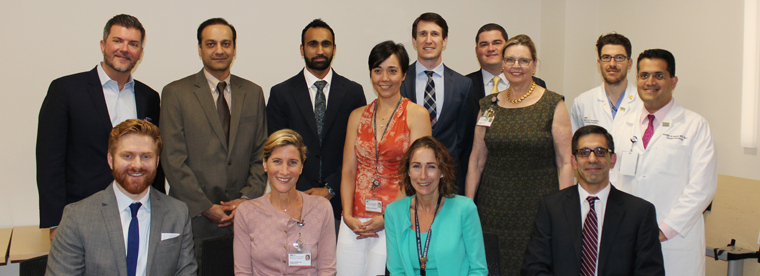The first class of MedStar Surgical Resident Research Program scholars presented the findings of their research in front of their peers and mentors at MedStar Georgetown University Hospital in June.
“The overall goals of this program are to provide opportunities for our residents to conduct meaningful and structured research experiences and facilitate effective collaboration between MedStar Washington Hospital Center and MedStar Georgetown University Hospital,” said Waddah Al-Refaie, MD, director, MedStar-Georgetown Surgical Outcomes Research Center.
This program was a joint venture between MedStar Health Research Institute (MHRI) and MedStar Health Academic Affairs, in conjunction with the MedStar-Georgetown Surgical Outcomes Research Center. A research council reviewed the proposals for both the resident scholars and faculty mentors prior to the program launch. The residents were all on clinical rotations while completing this work, working with associates from the MedStar Health Research Institute under the guidance of their mentors. The residents worked closely with associates from the MHRI Department of Biostatistics and Biomedical Informatics, who were instrumental in the data analysis for all four projects. The focus of each research project was determined and planned during the application process in early 2016.
Michael Sosin, MD, investigated the benefits of nipple-sparing mastectomy in order to fill a gap in clinical knowledge. “Expanding the Safety of Nipple Sparing Mastectomy to High Risk Patients” was a retrospective cohort review, which identified nearly 500 cases that could be evaluated for comparison between high-risk and normal-risk Nipple Sparing Mastectomies. Following the initial analysis into two risk categories, the cohort was reviewed to identify moderate-risk patients. Sosin will be presenting this research as an abstract poster a the fall meeting of the National College of Surgeons. He was mentored by Shawna C. Willey, MD, FACS, Eleni A. Tousimis, MD, FACS, and Troy A. Pittman, MD. Future goals for this research include expanding the data set to include other institution and the potential to create a guide for clinicians to assess their patients.
Chris Devulapalli, MD, focused his research on the rates of incisional hernias through a retrospective cohort study. Incisional hernias can be a common problem, with a reported incidence in nearly 20% of abdominal surgeries. This research helps to fill a gap in knowledge, as rates of incisional hernias in a high-risk cohort of cancer patients is poorly described in literature. The study, “Incisional Hernias Following Major Abdominal Cancer Operations,” sought to identify predictors of incisional hernias for those patients undergoing one of four procedures. After categorizing patients based on operations, the research showed no statistical difference in repair rates for each group. Following this, the surgeries were categorized with as malignant or benign in order to further track potential risk factors. Parag Bhanot, MD of the Department of Surgery at MedStar Georgetown University Hospital was Devulapalli’s mentor for this research.
Filipe Carvalho, MD, PhD, researched the use of neoadjuvant chemotherapy to treat patients with muscle-invasive bladder cancer. Bladder cancer is the fourth most common cancer in American men. The research, “Neoadjuvant Chemotherapy in Radical Cystectomy Outcomes for Bladder Cancer”, identified a 5915 patient cohort. The research identified patient-related variables to receiving neoadjuvant chemotherapy, include the location of medical treatment, social-ecomimic class and geographical location. While neoadjuvant chemotherapy is shown to help increase survival rates for bladder cancer patients, the research showed that nearly 70% of patients do not receive it as part of their care. This research can lead to future work in education for urologists on the benefits of neoadjuvant chemotherapy for their patients. Carvalho was mentored by Keith Kowalczyk, MD, Department of Urology, MedStar Georgetown University Hospital.
Conor F. Hynes, MD, sought to fill a gap in knowledge on thoracic cancers, as there is no current literature on the T-cell populations in esophageal cancer. This information can be used by treating cancers through individualized therapy for patients that is tied to their t-cells, a key to immune responses. The study, “Optimizing prognostics for thoracic malignancies through analysis of local immune cell contexture”, utilized univariate analysis to initially classify the tissue samples, followed by a multi-variable analysis. As this was a small cohort study, their current data set is small but leads to large future ideas. Hynes was mentored by M. Blair Marshall, MD, Chief of Thoracic Surgery, MedStar Georgetown University Hospital.
The MedStar-Georgetown Surgical Outcomes Research Center is a coalition of surgeons, other clinicians, and scientists committed to contributing to the scientific mission of Georgetown University Medical Center and MedStar Health by advancing the efficient and effective delivery of surgical care in the United States.

